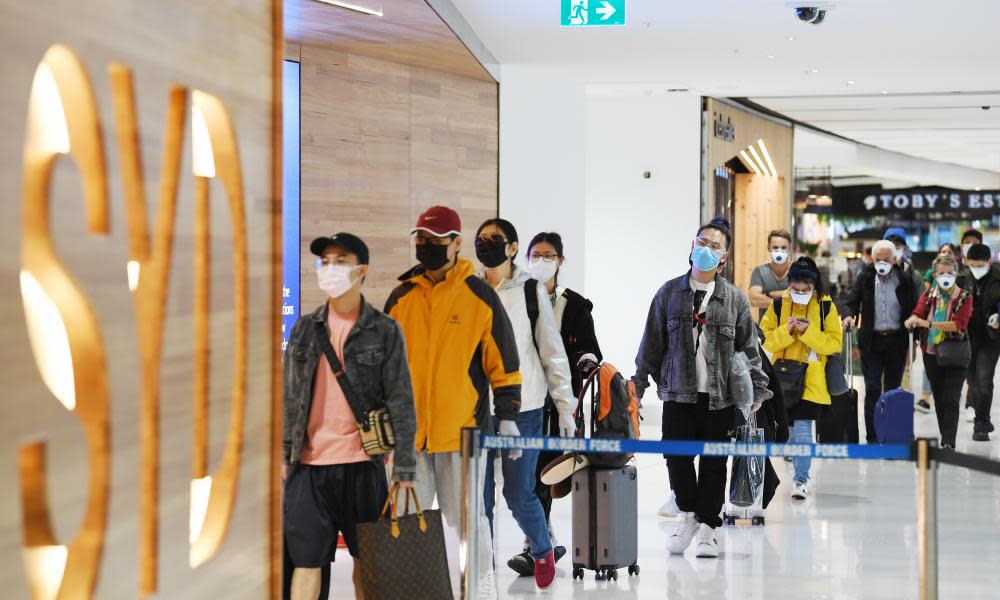Overseas arrivals to Australia to be quarantined in hotels for two weeks over coronavirus

Australian citizens and residents returning from overseas will be forced to quarantine in hotels in a bid to stop the spread of Covid-19 from returning passengers in breach of existing self-isolation requirements.
On Friday, Scott Morrison announced that national cabinet had agreed on the strict new measures to apply from midnight on Saturday, with the Australian Defence Force also set to help state law enforcement increase checks on passengers who arrived before the deadline, who are supposed to self-isolate for 14 days.
Morrison acknowledged that further restrictions will be required in New South Wales and Victoria to try and prevent an acceleration of community transmissions of the virus. He hinted further lockdowns will likely be sequenced with a third round of economic support from Canberra.
The prime minister told reporters he wanted to structure support allowing businesses to effectively “hibernate” during the pandemic and emerge on the other side with as few debts and liabilities as possible. One element of the package would involve protection for commercial and residential tenants.
Related: New Zealand coronavirus deaths during lockdown could be just 20, modelling suggests
Although Morrison did not detail how landlords and tenants will be protected, he told reporters in Canberra everyone would have to carry the weight of the economic shock – business tenants, landlords, banks and governments. The burden was one “to share”.
Morrison also confirmed that further work is being done to support childcare centres and that, after his talks with the Australian Education Union, teachers will now work directly with the states to transition to e-learning and ensure that “no child is turned away” if they still need or wish to attend school in person.
The chief medical officer, Brendan Murphy, said although authorities are still “very worried” as Australia has now passed 3,000 confirmed cases of Covid-19, there had been “dramatic improvements” in adherence to social distancing.
He noted more than two-thirds of Australia’s cases have been people returning from overseas and said the chief medical officers agreed “the single most important thing we can do is completely stop the capacity for any returning traveller transmitting the virus”.
From midnight Saturday, passengers returning to Australia will be quarantined for two weeks in hotels and other accommodation near the port of arrival, before any further onward travel.
Although arrivals to Australia have fallen due to global travel restrictions, there were still 7,120 arrivals on Thursday, as Australians returned after the government upgraded its advice on 17 March to return home as borders close around the world.
Morrison said the government continued to help Australians who “have found themselves, through no fault of their own, isolated”, citing its chartered flights from Peru, South America, Hawaii and the United States.
Morrison said it “is the job of the government” to help return or support the 20,000 who remain overseas.
But he warned that Australians who “have had an opportunity [to return] and – even more amazingly, those who continued to leave the country, even after a do not travel advice was given, then I don’t think they could expect their follow Australians to think that the Australian government would be having them high on the list of the people we need to go and support”.
Brandishing self-isolation cards signed by passengers who had returned since new requirements were introduced on 15 March, Morrison warned they are “legally enforceable”, with the ADF now set to help conduct “compliance checks” and “strong penalties” to be given out by state authorities for breaches.
The Labor leader, Anthony Albanese, indicated the opposition supported both the new quarantine laws and use of the ADF:
. @AustralianLabor supports new quarantine laws using Hotels for overseas arrivals. Also pleased our call for use of all assets including Defence has been taken up #COVID19Aus
— Anthony Albanese (@AlboMP) March 27, 2020
Later, the Victorian premier, Daniel Andrews, told reporters in Melbourne that further restrictions will be required – but neither Andrews nor Morrison explained when the third phase will apply, limiting Australians to access only essential services such as shopping for food and medical supplies.
Andrews said the hotel quarantine was the best way to achieve “absolute compliance” with self-isolation, rather than the current “honesty basis”, but also warned those in breach of current rules “will be caught” as police ramp up enforcement.
Both Morrison and Andrews thanked Australians for adhering to new rules despite the severe impact on social life, with Morrison citing the inability to go to the pub on a Friday, and Andrews noting Victorians would spend the first day of school holidays – a “beautiful autumn day” – indoors.
Morrison flagged that “going forward, the states and territories are getting in different phases of where the virus is at, and that you may see, in the future, greater variation in how far restrictions go in some parts of the country versus others”.
Morrison said existing restrictions were already “very significant” and “progress” in improving compliance with social distancing had given national cabinet “more time to consider these other critical issues” related to protecting businesses and tenants through the downturn.

 Yahoo News
Yahoo News 
